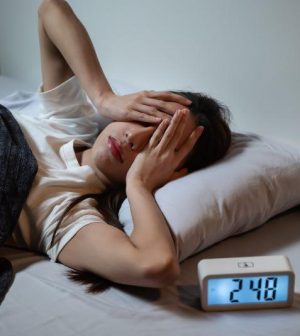- Could Your Grocery Store Meat Be Causing Recurring UTIs?
- Are You Making This Expensive Thermostat Error This Winter?
- Recognizing the Signs of Hypothyroidism
- 10 Strategies to Overcome Insomnia
- Could Artificial Sweeteners Be Aging the Brain Faster?
- Techniques for Soothing Your Nervous System
- Does the Water in Your House Smell Funny? Here’s Why
- Can a Daily Dose of Apple Cider Vinegar Actually Aid Weight Loss?
- 6 Health Beverages That Can Actually Spike Your Blood Sugar
- Treatment Options for Social Anxiety Disorder
Diabetes Risk Rises for Folks Who Get Too Little Sleep

Are you typically getting only a few hours sleep each night?
Besides leaving you groggy all day, your insomnia could also be raising your odds for type 2 diabetes, new research shows.
Compared to people who slept the recommended seven/eight hours per night, folks who habitually slept five hours per night had a 16% higher odds for the blood sugar illness, Swedish researchers found.
Those who got only three to four hours of shuteye faced a 41% higher risk.
Even if short sleepers ate a healthy diet, they still showed the same rise in risk for diabetes.
“Our results are the first to question whether a healthy diet can compensate for lack of sleep in terms of the risk of type 2 diabetes,” said study lead author Christian Benedict, a sleep researcher at the department of pharmaceutical biosciences at Uppsala University.
Benedict said in a university news release that there’s no need for short sleepers to panic over the link to diabetes, but the findings should “be seen as a reminder that sleep plays an important role in health.”
The new study was based on health and lifestyle data collected from almost 248,000 Britons as part of the UK Biobank database.
Tracking participants for over a decade, Benedict’s group found little difference in diabetes risk for people who got six hours of sleep per night (versus seven or eight).
However, vulnerabilities began to appear for people who slept less than six hours.
The study was not designed to prove cause and effect, and Benedict also stressed that diabetes is not a given for short sleepers. That’s because personal genetics, as well as a person’s individual sleep needs, vary widely, he said.
The findings were published March 5 in the journal JAMA Network Open.
More information
Find out more about the importance of good sleep to health at the U.S. National Institutes of Health.
SOURCE: Uppsala University, news release, March 5, 2024
Source: HealthDay
Copyright © 2026 HealthDay. All rights reserved.










